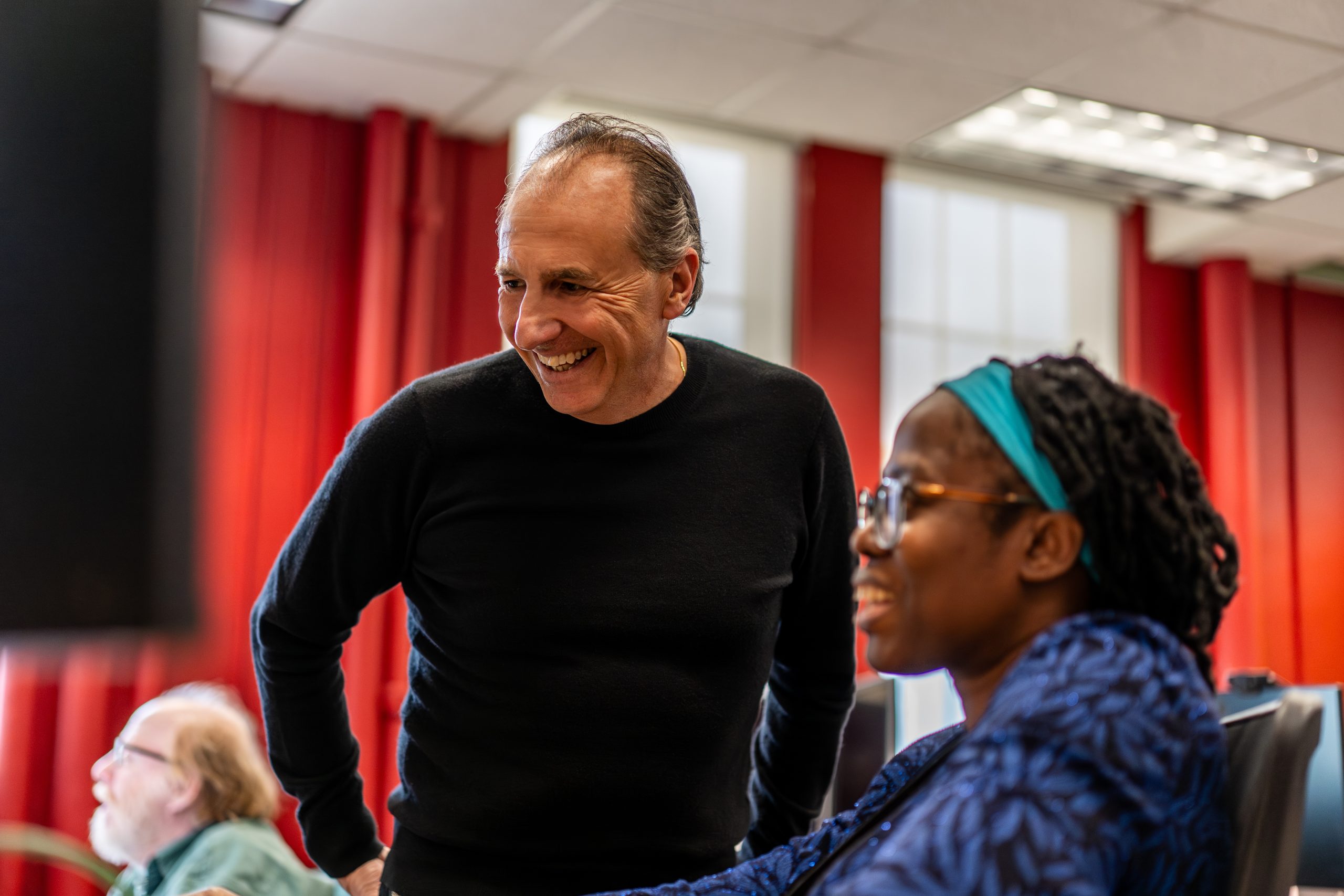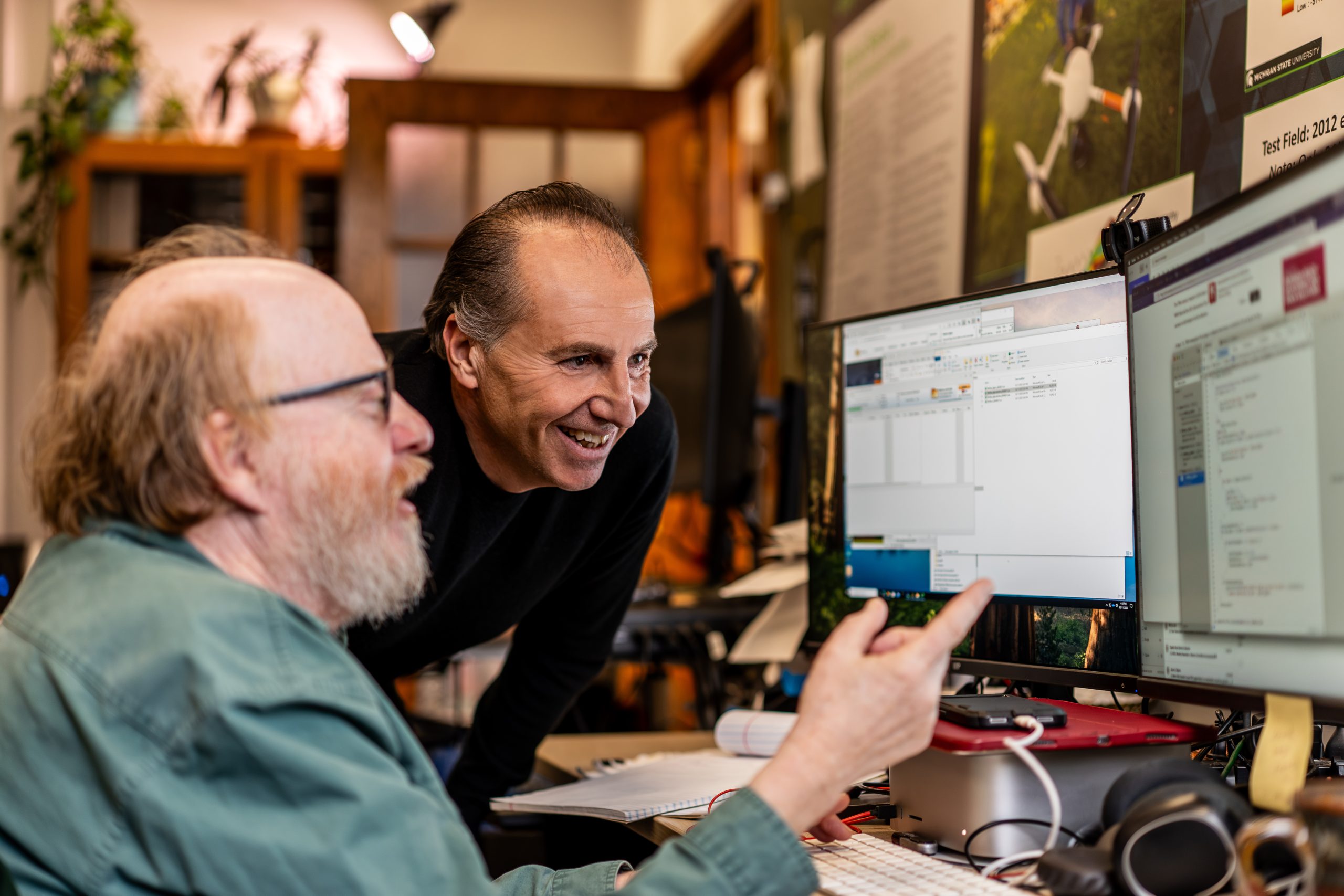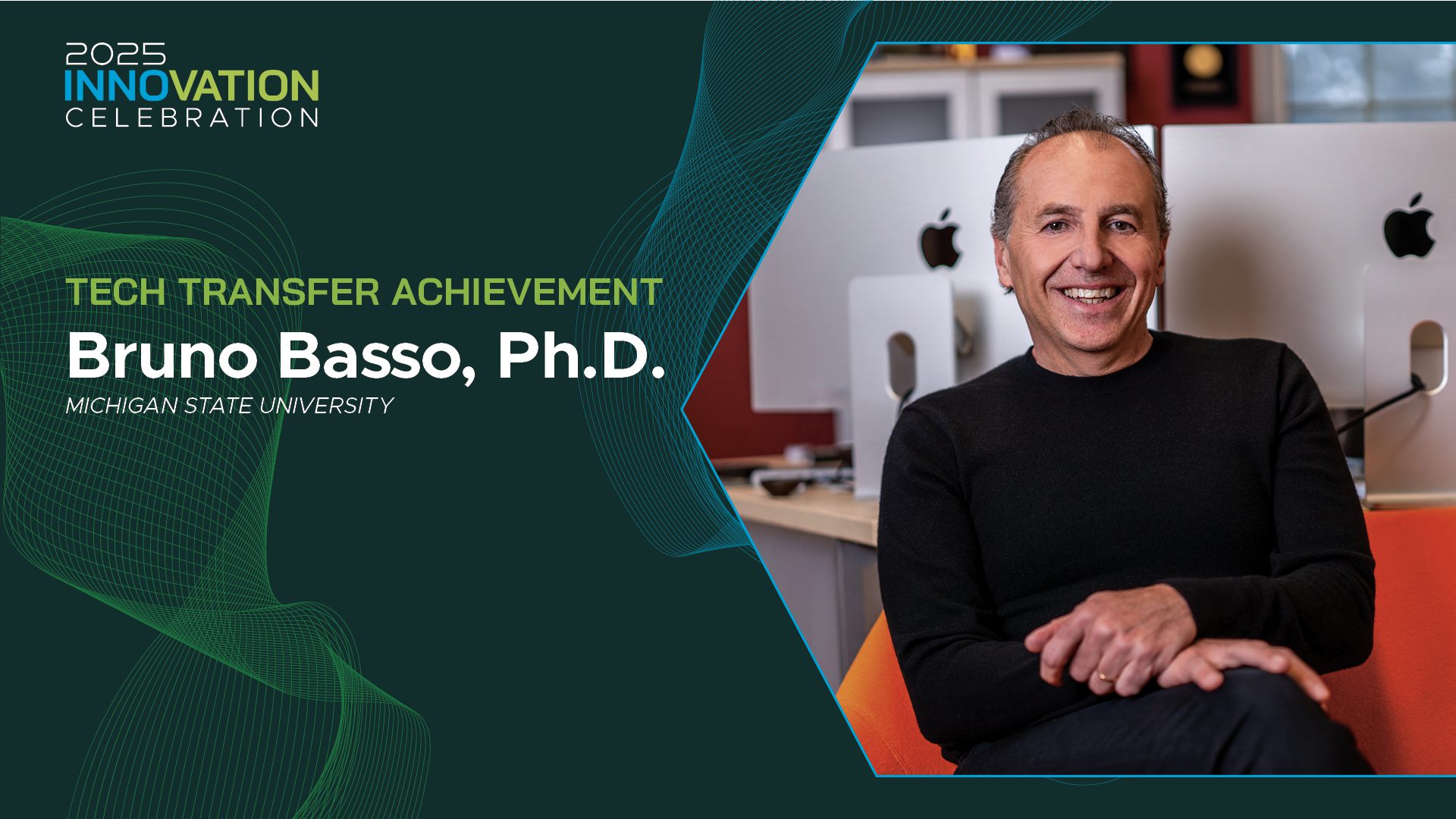As climate change continues to challenge agriculture with extreme weather events and prolonged droughts, and consumers demand more sustainable food options, farmers are increasingly seeking data-driven solutions to produce sustainable food production while making profit and reducing environmental impact. While agriculture feeds the world, it still impacts water quality and contributes approximately 10% of global direct greenhouse gas emissions, necessitating the shift toward more sustainable farming practices.

Enter CIBO Technologies, an MSU startup company that provides a suite of innovative science-based software tools designed to promote sustainable farming practices and empower farmers to make informed decisions based on cutting-edge tools, data and information. CIBO (Italian for “food”) builds upon the GeoYields technology developed by Bruno Basso, Michigan State University (MSU) John A. Hannah Distinguished and MSU Research Foundation Professor in the Department of Earth and Environmental Sciences, and W.K. Kellogg Biological Station and Plant, Soil and Microbial Sciences Department. Basso has studied these problems dedicating more than two decades to the development of technological solutions for the agricultural sector globally.
This year, Basso is being honored with the Tech Transfer Achievement Award, recognizing his long-term commitment to developing, licensing, and commercializing intellectual property at MSU.
Tom Herlache, MSU Technologies, worked with Basso to protect his GeoYields technology. “Bruno is great to work with. He’s very interested in seeing his science have a positive impact on society. One way to get greater impact from research is to apply scientific discoveries to applications and move those applications to a company. The company can then deliver products based on that technology so that people can use it, and Basso is very supportive of this,” said Herlache. “Basso’s work has impact at the farm level, improving farm profitability. It also benefits farmers and people off the farm by improving the sustainability of agricultural practices. With the assistance of MSU Technologies, Basso partnered with the venture capital firm Flagship Pioneering in 2015 to launch CIBO Technologies. Over the past decade, this startup has helped farmers across the U.S. and Europe enhance crop yields while improving environmental sustainability.
The Power of GeoYields Technology
GeoYields, which Basso and his team first developed at MSU, is an integrated system that creates a “digital twin” of a farm, by simulating plant growth and environmental conditions digitally. “Basically, we grow plants on the computer and quantify the impact of weather, soil and management on yield and the environment. We simulate not just the yield of single plants, but entire fields across the farm” explains Basso. 
Land composition can vary significantly on any given farm, with differing soil types, topography, and plant water availability. GeoYields maps these variables and analyzes how specific areas respond to heavy rainfall or drought events. By integrating globally patented tools, the system provides insights at both micro and macroscopic levels, guiding farmers toward more sustainable and profitable practices.
“Every single year, the climate is different. It can be hotter than the year before, drier or wetter, or a combination of these in the same season, too wet first, too dry later in the season,” says Basso. “Our system integrates scientific disciplines, from mathematics and biophysics to environmental and atmospheric sciences, to help farmers adapt.”
High-Tech Tools for Smarter Farming
GeoYields leverages two main technologies. The first is remote sensing technology that involves satellites, airplanes, or drone imagery, which can measure and analyze “yield stability” of the field, detecting yield changes across different years. The second is a computer model that evaluates land sustainability and potential crop yields at the field, regional and national level.
“This digital platform allows farmers to make more informed decisions regarding planting time, fertilization, irrigation, and the overall land management,” Basso explains. “By conducting long-term analysis, we can recommend the best strategies for maximizing productivity while minimizing environmental impact for each specific field in Michigan, across the US and globally.”
Farmers must make critical supply and demand decisions—determining how much water, fertilizer, and nutrients to apply, when to plant, and which crops to grow. These decisions can mean the difference between a successful harvest and a year of devastating losses.
The GeoYields-backed CIBO system draws on over a century of historical weather data, enabling users to make more precise assessments. Often, this results in converting underperforming land into areas that support biodiversity, such as planting pollinator-friendly crops. These changes can reduce greenhouse gas emissions by thousands of tons and unlock financial incentives for farmers.
A Measurable Impact
“The biggest reward is to see farmers embracing these changes and the technology that supports them,’ says Basso. “We can quantify reduced greenhouse gas emissions, improved water retention, and increased yields—all tangible benefits that stem from our system.”
MSU Technologies Assistant Director and Senior Technology Manager Tom Herlache, who worked on the licensing arrangement between MSU for the GeoYields technology and Flagship Pioneering, credits Flagship for taking Basso’s academic work and giving it incubator support, providing space for development, customer meetings, and commercialization for more than a decade. He remembers the importance of transitioning the technology from its academic underpinnings to something that was market-ready.
“Flagship Pioneering was looking to get into agriculture sustainability. They were interested in licensing software or high-tech tools for the agricultural market,” Herlache explains. “We had GeoYields, but it had been developed over decades with multiple programmers and in various coding languages,” he says. “We secured an internal grant to streamline the code and patented the technology, making it an attractive investment for the startup.”
Convincing farmers to adopt the technology was another challenge. “Flagship needed to convince farmers that this would benefit them. They only get one chance a year to get it right, which makes them conservative by necessity. If they have a system that works, they will keep doing that,” he says. “But once they saw how our tool could enhance sustainability and help them become more consistent while reducing their costs, they recognized its value.”
Herlache, a former molecular biologist, finds personal fulfillment in the project. “I wanted to help feed the world, and this technology does that. It helps feed the world more efficiently and more sustainably,” he says.
Looking to the Future
Dr. Basso’s work in researching and developing digital platforms and tools goes well beyond the success of CIBO Technologies. “Bruno has ongoing collaborations with companies across multiple industries” stated Jeff Myers, Director of Corporate Partnerships in the BusinessCONNECT Office of the MSU Innovation Center. His work attracts interest from all over the world and can involve complex business relationships. “Our office works closely with MSUT to facilitate and foster those relationships,” says Myers. “We all support Dr. Basso’s efforts to continue to be successful and a leader in the field of agriculture and food sustainability” he adds.
Receiving the Tech Transfer Award motivates Basso to push further. “An award sparks innovation—it’s never the end but the beginning of something new,” he says. “It drives me to reach the next frontier.”
He also considers the interconnectedness of the planet and its natural resources as he continues his research mission.
Basso also emphasizes the interconnectedness of science, food production, and natural resources. “Science is essential for societal progress. Next to it is food production, and alongside that is resource conservation,” he notes. “Our world is global, and technologies like this have worldwide impact. By respecting natural resources and advancing science, we can build a better future together.”
###
Want to Learn More About Dr. Basso’s Research?
- Dr. Bruno Basso’s Lab
- MSU researcher honored with Soil Science Research Award
- MSU team develops scalable climate solutions for agricultural carbon markets
- MSU scientist partners on biofuel policy for a carbon-neutral agricultural future
- Modeling Smarter Farming with Bruno Basso
- A Spartan Bringing Sustainable Agriculture Into The Future
Partner with MSU to Shape the Future of Sustainable Agriculture and Innovation
As climate change and consumer demand reshape farming, MSU is driving solutions that balance productivity, profitability, and environmental stewardship. From data-driven tools to digital platforms like GeoYields, developed by MSU researchers and commercialized through startups such as CIBO Technologies, we’re helping farmers adapt to extreme weather, reduce greenhouse gas emissions, and improve water quality—all while enhancing yields.
Whether you’re exploring sponsored research, licensing opportunities, or co-developing sustainable solutions, we’re ready to partner with you to advance agriculture for a global future.
Interested in partnering with MSU faculty on agricultural innovation?
Visit innovationcenter.msu.edu or contact us to start the conversation.
About the MSU Innovation Center:
The MSU Innovation Center combines research partnerships, technology transfer, and startup support for MSU faculty who aim to see their research applied to make the world a better place.
Composed of Business Connect, MSU Technologies, and Spartan Innovations, the MSU Innovation Center aims to amplify the impact of faculty research and drive economic growth while positively impacting society to solve real-world challenges with cutting-edge ideas.
Through mutually beneficial, long-term partnerships with the private sector, we connect MSU faculty with companies for corporate-sponsored research collaborations. We also play a key role in facilitating the commercialization and public use of technologies and copyrightable materials, moving MSU’s innovations from the lab to the marketplace. Importantly, we provide significant support for faculty entrepreneurs in establishing startup companies based on technologies developed at MSU.

